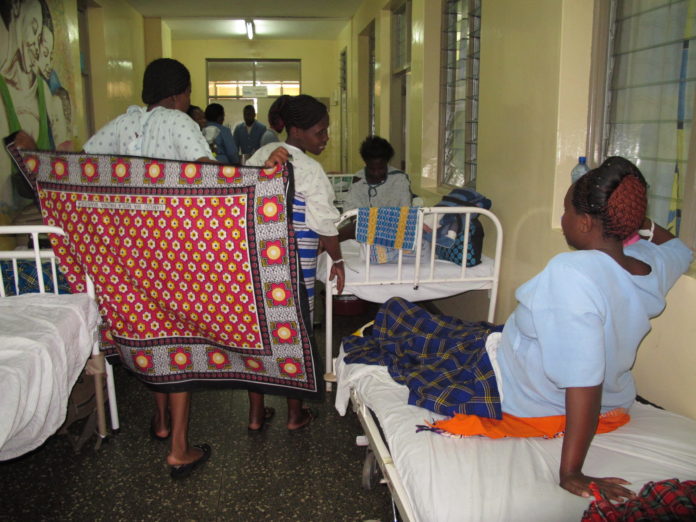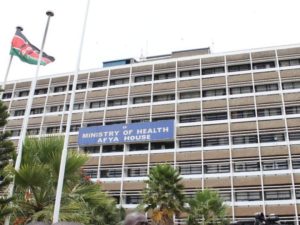
By Mary Mwendwa
Mwangi Njuguna’s pregnant wife was just admitted to Pumwani Maternity Hospital on the outskirts of the Kenyan capital. Though he is about to become a father from the first time, the 35-year-old readily admits that what should be a happy moment is instead fraught with anxiety and fear.
“My heart is beating very fast. I do not know what to do,” he tells Talk Africa, from a visitors waiting bay at the hospital. “I have no money at the moment … I am depressed.”
Njuguna, who lives in a nearby slum called Majengo which is densely populated, located East of Nairobi, brought his wife, Diana Njuguna, to the large hospital hoping to take advantage of a free maternity programme rolled out during president Uhuru Kenyatta’s first term.
These were just some of recent scenes at Pumwani Maternity Hospital before word went round that they were no longer offering free maternity services .
They later stopped charging but for patients visiting the hospital, they are not assured of free services.
The unexpected can occur. Being slapped with a bill.
The program entailed covering four antenatal visits and free deliveries for pregnant women in all public hospitals across the country in all 47 counties. These services were for free.
But the programme seems to have been suspended in some health facilities this year because of misunderstandings shared with county administrators.

The programme ran from 2013 targeting over one million mothers with an estimated budget of 9 billion KSH annually. According to Dr. David Kariuki, Head, Department of Policy Planning and Health Financing, Ministry of Health, “All government facilities are supposed to offer free maternity services to women in all the counties, no complain has reached us that any woman is paying for this services, in case someone is charged let them get in touch with us formally through writing so that we can follow it up” He emphasizes.
Njuguna said his wife got antenatal – before birth – medical services at a local clinic in Majengo where they reside which informed her that her delivery would cost $35. So that’s how much the small businessman who hawks sweets and water on the streets and earns around 70 -80 Dollars per month saved.
But when the couple arrived at the hospital, hospital staff informed them the delivery would cost between 60 Dollars for normal delivery. That unexpected extra cost was “a blow”, Njuguna told Talk Africa. “I do not have anyone to help me with this extra cost, I will try my luck with friends and family to help me raise the extra 25 Dollars and pay them back when I get some money, for now, that is the only option.”
“I have never heard any announcement that a woman does not just walk in a public facility to deliver but needs to enroll for the Linda Mama programme ( Take care of mother – in Swahili ) – A programme that runs the free maternity services .”
Services strained
Patients and visitors walk in and out slowly, some cuddling newborns while others are carrying foodstuffs especially flasks with tea and other hot drinks. Empty ambulances both for the hospital and the Beyond Zero Campaign, a project that was started by the first lady, Margaret Kenyatta lie idle at the compound.

A clear warning is written in red block letters that, no media is allowed beyond the gate. This makes it difficult for any journalist to enter and display their cameras and recorders for interviews. Many public big public health facilities in Kenya are never comfortable with the press to enter their premises because of stories of negligence and the poor state of some facilities.
Strikes because of delay in paying health workers has become the order of the day in most county hospitals hence compromising service delivery in most of these facilities. Because of the frustrations, many people who have brought women for delivery here are hit with, many converse easily as they pour their tribulations to one another.
Diana Wangari who looks in her mid-forties lays her hands on her cheeks as she talks to a relative of her daughter in law whom she brought the previous day at the hospital ”I brought my daughter in law yesterday in labour, her water broke while we were sleeping and we rushed her here, the first thing the doctor recommended was an ultrasound which would cost us 18 dollars, we had nothing so we left her writhing in pain and we have come she has not delivered or the ultrasound done.”
Wangari rushes to the labor ward and comes with more news, that she has been told to go prepare 180 dollars for the caesarian section.”The doctor has told me we look for 180 dollars for the surgery, we have nothing where do we get the money, this free maternity program was like a scam, many women are not aware that it has been scrapped and one has to pay or have a medical cover, we are poor from the slums.
Cases similar to Wangari and Njuguna are not new at Pumwani hospital since the free maternity program was rolled out, unclear communication on how the program works is what many low income patients have to endure.
This has resulted in many patients opting for other alternatives like traditional birth attendants and sub- standard private clinics.
Kenyans from low-income areas are the majority who rely on public health facilities for treatment and childbirth is a critical component of this.

Last year the ministry of health had one of the biggest scandals where (52 billion KSH) of money could not be accounted for and part of this money was said to cater for the free maternity. To date, no one has ever been prosecuted.
At the billing section, a true reflection of no free maternity is evident. I get to know that nothing is offered for free here. Normal delivery ranges between 50 to 80 dollars. All clinics that a pregnant mother attends she has to pay 2 dollars per visit and all tests including the ANC profile are charged separately. Something that most pregnant mothers who visit the facility feel is too expensive for them to afford and some opt for other means like the use of Traditional birth attendants (TBA’s) whose services are highly sorted in informal and rural
settings.
According to Geoffrey Maingi CEO National Health Insurance Fund ( NHIF), all public health facilities in Kenya are supposed to offer free maternity through a project dubbed, Linda mama .This project is run by NHIF through the ministry of health and offers prenatal and postnatal services including deliveries and other complications related to deliveries.
“An expectant woman needs to register through a short messaging code that helps her fill in her details to allow her to be registered in the system.”
Maingi notes that there could be miscommunication at some levels that is making some facilities like Pumwani Maternity charge pregnant women for deliveries. According to Nerea Ojanga, Chief Nurse Kenyatta National Hospital (KNH), one of the biggest referral hospitals in Eastern Africa, says “Hemorrhage and other infections like sepsis have been known as major causes of maternal and newborn deaths , health financing has also been decreasing with time.”She notes.
”85 percent of expectant mothers would deliver normal while the rest would need specialized attention therefore it is important for every mother to deliver in a health facility to reduce maternal and new born deaths,” Nerea adds.
She agrees to the fact that the free maternity project had its own challenges like social- cultural barriers that some not access the services.
Similarly, Dr.Innocent Maranga from the Maternal and Reproductive Health Services, KNH says deliveries are the heart for any health facility.”How a country is moving forward in the health sector is reflected in the maternal health sector. Sadly, as a country, we have not
honored the Abuja declaration which Kenya is a signatory to, states are supposed to set 15 percent of their budget spending to the health sector, that has not been achieved so far.”













